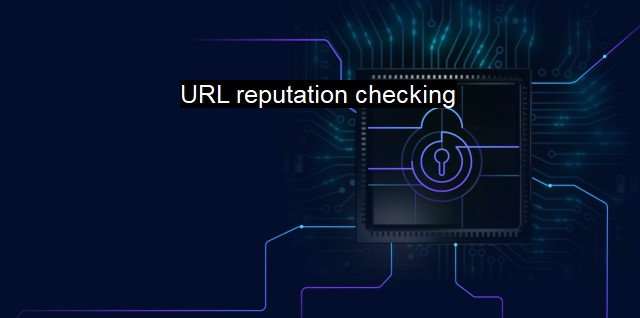What is URL reputation checking?
The Importance of URL Reputation Checking for Cybersecurity and Antivirus Protection against Online Threats
"URL reputation checking" is a concept in the cybersecurity and antivirus sphere that pertains to reviewing, assessing, and scoring the credibility, safety and security level of a given Uniform Resource Locator (URL). It is performed as a measure to protect internet users from being exposed to harmful, malicious, or dubious websites that may threaten the security and integrity of their systems and their digital information.In simplest terms, URL reputation checking can be compared to doing a background audit or a safety scan on a vehicle before purchase. Just as you'd check for any potential faults that may compromise your safety before making your final decision, URL reputation checking is all about preemptively identifying potential threats posing from seemingly harmless URLs.
Malicious URLs are major cybersecurity threats. They can lead to malicious websites, host malware or unwanted software, or participate in phishing or deceptive practices. Consider the gargantuan volume of phishing attacks solely, with the figure jumping by 220% during the pandemic year. Therefore, URL reputation checking is a pivotal part of any comprehensive cybersecurity strategy aimed at averting risks of cyber infections, hijacks, identity thefts, financial losses and the resultant reputational damage.
Reputation scores for URLs are commonly determined by cybersecurity intelligence through advanced algorithms that assess a broad array of associated risk factors, and the findings shared with users differ from tool to tool. They can range from a binary safe-unsafe rule to a nuanced scoring spectrum. To achieve this, URL reputation checking tools integrate a vast cybersecurity intelligence network's power and data to help produce an accurate real-time analysis of the subject URL's overall safety status. Comprehensive factors such as the URL's history, host reputation, domain attributes, geoproperties, associated IP addresses, the webpage behaviour, and content elements can all play a crucial role in assessing the reputation of a URL.
Many antivirus solutions provide URL reputation checking features as a part of their protective suites. Users can manually submit URLs for checks or have web browsing security layers that perform these checks automatically as they surf. Other tools presented as standalone cybersecurity products designed to check URL reputations are also available. Most tools designed for this express purpose additionally run a suite of supplementary features aimed at enhancing the user's cybersecurity empowerment, such as blocking malicious outgoing connections and warning the user about them before they occur.
The significance of URL reputation checking is emphasized not merely for individual internet users but at the enterprise scale too. Businesses and establishments with a firm online presence need to ensure that internal networks tightly guarded from cybersecurity threats. Employing regular URL reputation checks before every access or enforced automatically through URL filtering applications ensures not only a shield against external threats but also the minimisation of internal threats such as access violations by employees. Internet service providers and cybersecurity entities can also use this tool effectively to flag known malicious links, making it doubly essential in today's world fraught with cybersecurity propagated via the internet.
URL reputation checking is a proactive toolkit in the multi-pronged approach to maintaining cybersecurity. It is a significant front-line defence against the surprisingly equipped fraud of today's increasingly sophisticated world of cyber threats. Whether breaking the chain of infection as you casually surf online or protecting key servers and infobanks in business establishments, URL reputation checks stand as indispensable cyber bodyguards. It is crucial to leverage this cybersecurity field tool for improved cybersecurity protection, while also keeping up-to-date on emerging threats and improving best practices. The war against cyber threats is a dynamic and ongoing challenge for which URL reputation checking serves as a practical and influential weapon in the defensive arsenal.

URL reputation checking FAQs
What is url reputation checking in cybersecurity?
URL reputation checking is the process of analyzing the trustworthiness of a URL or website. It involves checking the URL against a set of known malicious URLs or categories of websites to determine if it poses any threat to your system.Why is url reputation checking important in antivirus software?
URL reputation checking is an essential feature in antivirus software because it helps to protect your computer from malware, phishing attacks, and other types of cyber threats. By checking the reputation of URLs that you visit, the antivirus software can warn you if a website is unsafe and block access to it.How can I perform url reputation checking?
You can perform url reputation checking using a browser extension, such as Web of Trust, or by using an online URL scanner like VirusTotal. Most antivirus software also includes URL reputation checking as part of their security solution.What should I do if a website has a poor url reputation?
If a website has a poor URL reputation, it is best to avoid visiting it altogether. You should also run a full system scan on your computer using an antivirus software to ensure that your system has not been compromised. If you have already visited the website, it is recommended that you change your passwords for any accounts that you may have logged into while on the site.| | A | | | B | | | C | | | D | | | E | | | F | | | G | | | H | | | I | | | J | | | K | | | L | | | M | |
| | N | | | O | | | P | | | Q | | | R | | | S | | | T | | | U | | | V | | | W | | | X | | | Y | | | Z | |
| | 1 | | | 2 | | | 3 | | | 4 | | | 7 | | | 8 | | |||||||